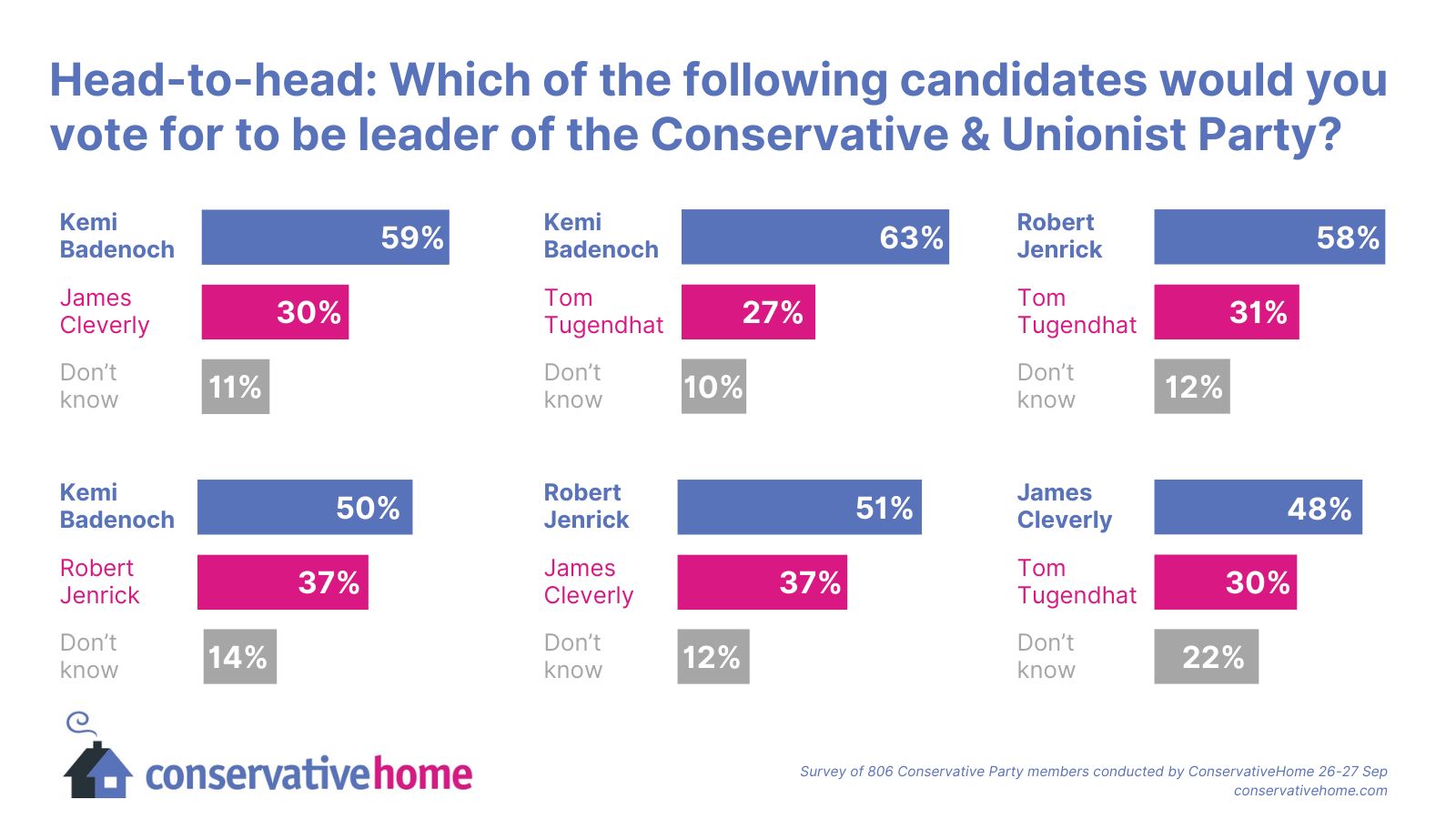[ad_1]

The Conservative Party Conference starts today, and we’ve decided to kick it off with a special edition of our leadership survey – ahead of the full survey which we’ll run next week. The reason? To see what, if any, difference the next few days make to the scores.
After all, one of the justifications for this very long contest was the 1922 Committee’s decision to extend it over the conference season. The decision to split the MPs’ voting rounds into two was also justified by letting four candidates make their case in Birmingham (and, surely not unrelatedly, having to stump up £200,000 a piece for the privilege).
So today we’ll survey the terrain, and check back in a week – before MPs winnow the field down to the final two – to see whether any of the hopefuls managed shake up what has been, so far, an extremely stable (one might say uneventful) replied.
Looking at the first preferences, there’s only one change that looks solidly outside the margin of error: Robert Jenrick has gained seven points, increasing his lead over Tom Tugendhat (and a marginally-improved James Cleverly) from five points to 12. This gain is almost exactly the score Priti Patel secured in our last survey , suggesting he has picked up the vast majority of her supporters.
This narrows somewhat his gap with Kemi Badenoch; Likewise, his margin of defeat in a hypothetical head-to-head between the two (see below) is also down, from 17 points to 13, although he is still behind in both.
Other than that, the picture hasn’t really changed much in our final-round questions: Badenoch still beats all comers, Jenrick sees off both the One Nation challengers, and Cleverly vanquishes Tugendhat (and by very similar margins to last time).
Yet at this stage, these numbers matter only insofar as they impact MPs’ calculations going into their final voting rounds. As I explained earlier this month , Badenoch’s path to the final round seems fairly narrow – and her very strong numbers may well make it narrower still.
Add together the votes received by Cleverly, Tugendhat, and Mel Stride, and there is more than enough to put a One Nation candidate in the final found. Jenrick, meanwhile, continued to lead the pack after the second round and absent a large bloc of Stride supporters rowing in behind Badenoch) presumably still does.
His lead over Badenoch, at five votes, is not insurmountable. But where would they come from?
Were the Shadow Housing Secretary looking certain to reach the membership round, her support would likely snowball as MPs sought to get in with the winning side. As it stands, however, it isn’t. Right-wing MPs with reservations about Badenoch can take comfort in the evidence that Jenrick is a strong horse for the final vote, while the One Nation wing can (if they remain cohesive) ensure one of their own makes it through and that they face the more beatable than their two possible opponents.
Perhaps something at the Conference will overturn the applecart. If not, the crucial moment seems likely to come after the third round of MP voting, when either Cleverly or Tugendhat is knocked out. Depending on the margins, their supporters may have the choice of putting either the other One Nation challenger or Badenoch in the final.
That leaves the latter in an invidious position: getting to the membership stage probably requires wooing MPs (not her strong suit anyway) on the other wing of the party (which presents openings to Jenrick’s campaign). Failing to do so and instead leaning into her membership pitch (eg telling the Spectator how big a fan she is of Elon Musk ) risks making all these impressive scores irrelevant.

[ad_2]
Source link



